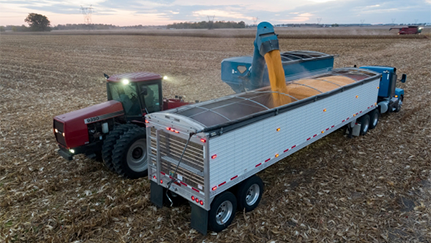With the growing truck and vehicle fleets being maintained on today’s large farms, farmers are looking more like commercial agribusiness managers every day. While that evolution opens up new risk exposures, safety is just one of the value propositions that makes telematics a worthwhile addition to any large farm operation.
Telematics is a collection of sensors that collects vehicle operation data and displays it on a mobile app or desktop web browser. It allows you to keep track of your fleet’s operation and manage maintenance and upkeep. It also provides a view of driver behavior and helps maintain a safe, attentive workforce on the road and in the field. In short, telematics enables you to keep tabs on everything that contributes to productivity and efficiency as well as potential risk exposure. Also see benefits of farm equipment asset tracking.
“Telematics generates data just like farmers get from their yield monitors in the field,” said Nationwide Agribusiness Senior Risk Management Consultant Brian Hammer. “During harvest, you used to have to call the grain elevator to find out if your driver had unloaded grain yet so you could plan around the trip back to the field. With telematics, now you know where your truck is in seconds.”
Telematics can generate value three ways:
1. Production/logistics. Knowing the locations of multiple vehicles on the road can help you better manage field operations and other farm work. Telematics provides real-time location data and facilitates informed decisions on what’s next in the field or on the road. You can also get notifications when trucks move, helping confirm your drivers are on the road when they’re supposed to be and trucks aren’t moving when they’re not, like in the middle of the night.
2. Safety. Telematics documents excessive speed, hard braking and sharp cornering, all of which can indicate aggressive or inattentive driving. Cameras monitor drivers’ behavior to ensure they aren’t operating carelessly or inattentively, helping you manage your workforce and provide incentives for safe operation. Fuel sensors on many telematics systems shed light on driver behavior; rapid acceleration, for example, often causes fuel economy to decline.
3. Maintenance. Sensors can alert you to any triggered engine fault codes and when it’s time to conduct routine maintenance at the optimal times. This can also help you manage operating expenses by helping minimize the likelihood of costly unexpected repairs through improved routine maintenance.
Hammer said any farmer who’s got multiple trucks on the road should consider how telematics can help operate more safely and efficiently.
“Telematics is common in the commercial trucking industry, and we’re taking what we have learned there and applying it to the farm,” he said. “Farmers are already accustomed to generating and managing data. Telematics is another tool to help farmers make informed decisions to improve their efficiency and productivity.”
Contact your Nationwide Farm Certified agent to learn more about integrating telematics into your operation.
